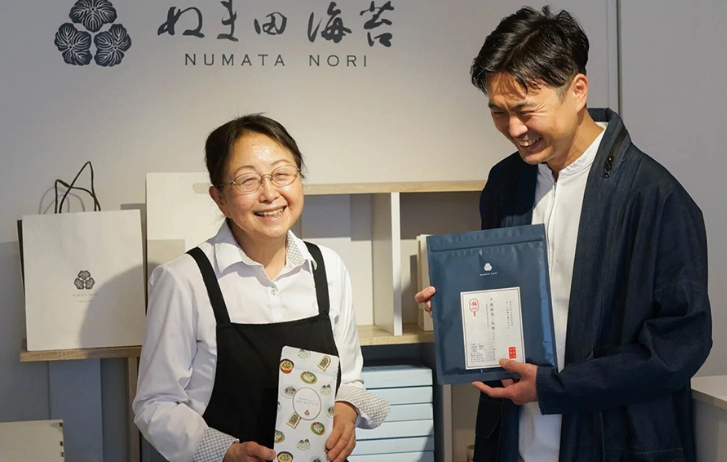
How A Small, Family-Owned Nori Brand Is Winning Global Fans
By FedEx | March 11, 2024
Nori, also known as dried edible seaweed, has long been a prominent ingredient in Japanese cuisine. One shop owner in Tokyo is working to introduce the authentic taste of single origin nori to the world.
Step into a Japanese convenience store, and chances are, you’ll be met with shelves stocked full of nori-wrapped onigiri (rice balls) and sushi rolls. In Japan, the crispy, umami-packed sheets of seaweed are an iconic part of the local food culture and can be found in everything from home cooking to dishes served at Michelin-starred restaurants.
Besides using them to wrap rice and other foods, nori can be enjoyed in countless ways and forms, including tsukudani, prepared by simmering the seaweed in soy sauce and mirin. Korean style nori, seasoned with sesame oil and salt, is also popular and widely available.
Thanks to the popularity of Japanese food around the world and growing awareness of its nutritional benefits, nori has been gaining international recognition beyond Asia.
Changing domestic consumption trends
Despite its rising international profile, the domestic nori market has been in gradual decline since the 2000s, driven by rising prices and changing lifestyles, particularly among young people.
According to a government survey, the amount spent on nori by younger households in 2023 was just half that of the national average. Furthermore, a study of Gen Z university students in Nagoya found that nori is mainly consumed through restaurants, takeaway and deli food, so it is no longer a household pantry staple.
A series of poor harvests in recent years is another contributing factor. The November 2022-May 2023 season saw a record 51-year-low output due to bad weather and a red tide outbreak in Japan’s biggest seaweed producing region. Prices increased significantly as a result.
But as one small business owner can attest, a drop in quantity doesn’t mean a drop in quality. Meet Shoichiro Numata, the fourth-generation head of Numata Nori: the first shop in Japan to specialize in rare, “first-pick” nori from the Ariake Sea.
Numata worked in the apparel industry for 17 years before deciding to return to the family business. He has made it his mission to introduce high-quality, authentic nori to as many people as possible, taking the strategic decision to relocate to the Kappabashi kitchen town in Tokyo. The district boasts around 160 specialty stores attracting culinary professionals and tourists from all over the world.
Spreading the love of single origin seaweed
Since May 2018, Numata Nori has been cultivating fans of single origin seaweed via its small store, social media channels, and online shop.
About 60% of seaweed produced in Japan hails from the Kyushu region, and nori grown in the Ariake Sea is particularly prized for its complex flavour. However, first-pick nori from this region accounts for less than 1% of all nori being sold in Japan, due in part to the unpredictable output and difficulty in handling the delicate sheets, which tear easily.
But this is where Numata Nori has found its niche as a small business, taking a terroir-driven approach to provenance.



Creating high-quality products
Each year, Numata carefully selects the best nori from different fishing grounds around the Ariake Sea, meaning that the product line-up is always changing. To convey the subtle differences in taste by origin, Numata Nori has taken the unusual approach of using the name of the fishing ground and quality grade of the nori as the name of each product.
The package label includes a chart showing the flavour profile and texture, helping customers better appreciate the characteristics of each fishing ground.
Numata has also found a way to make the most of the damage that inevitably occurs to about 10% of his delicate inventory, by putting on nori roasting demonstrations and offering samples to customers at his store in Kappabashi’s famous shopping street.
The importance of customer feedback
As a small business owner, Numata values the input of local customers and incorporates their feedback into product development. When a customer mentioned that the traditional full-size 21 cm x 19 cm of dried nori sheets were difficult to use in everyday meals, he introduced smaller cuts and finely chopped versions.
He has also developed close ties with fellow merchants in the Kappabashi neighborhood, who recommend Numata Nori to their customers, including visitors from overseas. Word of mouth has since spread far and wide, with customers from all corners of the globe seeking Numata Nori’s unique seaweed.
While keen to share his deep knowledge of seaweed with customers, Numata has found that there is a lot to be learned from foreign visitors.
When a customer from Italy mentioned that a particular line of nori matched well with gorgonzola cheese, he started exploring other food pairings – and regularly posts his findings on social media.



Gaining global fans through social media
Numata’s posts about the nori industry, new projects, and business insights have amassed nearly 11,000 followers on the popular Japanese blog platform, note.
Social media has played a key role in growing Numata Nori’s overseas fan base. Numata stresses that it’s important to get foreign customers to follow you on social media. Even if they’re impressed by the taste of the nori in the shop, it won’t mean much if they can’t remember the name of your store once they get home.
He also makes sure to hand out contact information and details on how to place international orders. To date, he has shipped nori to more than 15 countries, ranging from Europe to Australasia.
Reflecting on the changing domestic market, Numata writes, “With domestic consumption shrinking, there may be times when we feel insecure about our products. But being in Kappabashi, I feel that traditional Japanese goods and product quality are attracting attention from all over the world. Since we have good, valuable products, we should feel confident enough to look beyond Japan.”
SHARE THIS STORY
- Generative AI: A New Frontier
- How To Ship A Giant Panda
- How To Make Freight Shipments Work For Your Small Business
- The Rise Of Intra-Asia Trade: Opportunities In The China-Southeast Asia Corridor
- Where Do Old Planes Go When They Retire?
- What’s So Dangerous About Coconuts? Your Guide To Dangerous Goods Logistics
Sign up now and save on your shipping rates!
Sign up now and earn discounts by shipping instantly with FedEx Ship ManagerTM at fedex.com.
Recommended For You

5 Reasons Why SMEs Should Look To Intra-Asia Trade
Intra-Asia offers immense opportunities for the region’s SMEs and e-commerce operators to unlock new business growth.
Read More
The Online Mall Bringing Japanese Brands To The World
An e-commerce platform curating Japanese products and souvenirs is experiencing a surge in cross-border sales as interest in Japanese brands grows.
Read More
How Japanese Crafts Are Finding New Audiences Online
Traditional Japanese art and craftsmanship has fascinated the world for centuries. Today, SMEs in Japan are adapting to the new e-commerce landscape.
Read More

